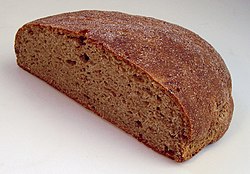This article needs additional citations for verification. (January 2017) |
Potato bread is a form of bread in which potato flour or potato replaces a portion of the regular wheat flour.[1][2] It is cooked in a variety of ways, including baking it on a hot griddle or pan, or in an oven. It may be leavened or unleavened, and may have a variety of other ingredients baked into it. The ratio of potato to wheat flour varies significantly from recipe to recipe, with some recipes having a majority of potato, and others having a majority of wheat flour. Some recipes call for mashed potatoes, with others calling for dehydrated potato flakes. It is available as a commercial product in many countries, with similar variations in ingredients, cooking methods, and other variables.
 Potato bread | |
| Type | Bread |
|---|---|
| Main ingredients | Potato, flour, wheat flour |

Alternative names
editPotato bread goes by many regional names, including slims, fadge, potato cake, potato farls, and tatie bread in Ireland. "Potato cake" can actually refer to numerous dishes.
Varieties
editBrazil
editBrazilian potato bread is usually a light airy bread, made in small round loaves with potatoes or potato flour mixed with wheat flour, milk, eggs and yeast and then baked. It can also be found with Catupiry filling and is usually consumed as a snack all over the country.
Chile
editPotato bread, in different forms, is a common element of the cuisine of Chiloé in Southern Chile. The most popular breads are milcao and chapalele, which are part of the traditional curanto.
Germany
editKartoffelbrot (German: [kaʁˈtɔfl̩ˌbʁoːt] ) is a potato bread that may contain spelt and rye flour.
Berches is a German-Jewish bread made for Shabbat. Like other Ashkenazi challot, it is typically braided, but unlike the sweet, eggy challah of eastern Ashkenazi cuisine, berches bread contains boiled, mashed, and cooled potato, and has no egg and very little sugar in the dough. Some recipes contain oil, and some do not. It is often topped with an egg wash (even if there is no egg incorporated into the dough itself), and poppy seeds. While there are few German Jews left living in Germany, the tradition of making berches has been carried on by non-Jewish bakers, who are aware of the bread's Jewish history.[3]
Hungary
editPotato bread is a part of the cuisine of Hungary.[4]
Northern Ireland and Republic of Ireland
editOn the island of Ireland, potato bread or cakes known as boxty (Irish: bacstaí) were popular, and may have been a result of the floury types of potatoes that were common in the country.[5]
Potato farls are one large round divided into four quadrants or square slices (usually around 0.5–1 cm in thickness) of soft potato bread, lightly powdered with flour and are common in Ulster, especially Northern Ireland. They are traditionally used as one of the distinguishing items of food in an Ulster fry, where they are shallow-fried on both sides for a short time and served with soda farls cooked in the same way. They can also be grilled and buttered, or eaten with a variety of toppings.[6]
Apple potato cake or "fadge" was cooked in Ireland in autumn, when cooking apples were available, and very popular in the north-east of the country. Freshly cooked potatoes are mixed with melted butter, salt, and flour.[5] It is a potato bread wrapped, pastry-like, around a sweet filling of apples.[6]
Poland
editOkrągły chleb kartoflany is a light and airy potato bread.[7]
Scotland
editThe Scottish tattie scone, also known as a "tottie scone" or "potato scone", is similar to the Irish potato farl. They are generally shaped as one large round divided into four quadrants, in a similar fashion to traditional Scottish oatcakes, or as small rounds.
United States
editPotato bread is commercially available in the United States as a light and airy bread very similar to normal mass-produced white bread, but with a yellow tint, thicker texture, and a light potato flavor.
Cherokee sweet potato bread is a variation on potato bread that uses sweet potatoes.[citation needed]
See also
editReferences
edit- ^ Mu, T.; Sun, H.; Liu, X. (2016). Potato Staple Food Processing Technology. SpringerBriefs in Food, Health, and Nutrition. Springer Singapore. p. 9. ISBN 978-981-10-2833-5. Retrieved January 9, 2017.
- ^ Hensperger, B. (2000). Bread Lover's Bread Machine Cookbook: A Master Baker's 300 Favorite Recipes for Perfect-Every-Time Bread-From Every Kind of Machine. Harvard Common Press. p. 77. ISBN 978-1-55832-156-4. Retrieved January 9, 2017.
- ^ Gropman, Sonya (June 2018). "A Jewish Bread Lives On in Germany". TASTE. Retrieved 9 May 2020.
- ^ Treuille, E.; Ferrigno, U. (2004). Ultimate Bread. DK Pub. p. 103. ISBN 978-0-7566-0370-0.
- ^ a b Mahon, Bríd (1998). Land of milk and honey : the story of traditional Irish food and drink. Dublin [Ireland]: Mercier Press. p. 139. ISBN 1-85635-210-2. OCLC 39935389.
- ^ a b Hickey, Margaret (2018). Ireland's green larder : the definitive history of Irish food and drink ([Paperback edition] ed.). London: Unbound. pp. 65, 248. ISBN 978-1-78352-799-1. OCLC 1085196202.
- ^ Dooley, B. (2015). In Winter's Kitchen. Milkweed Editions. pp. 60–61. ISBN 978-1-57131-881-7. Retrieved January 9, 2017.